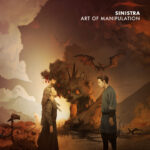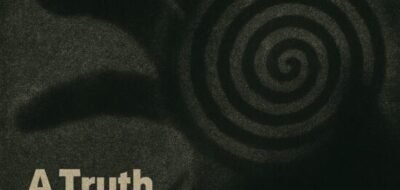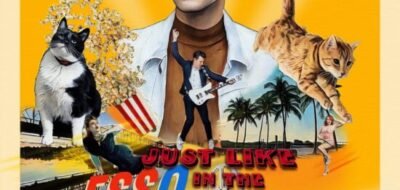After a few false starts I am finally sitting down to write this feature on Edmonton’s own Wares. My brother sent me a link to the new LP Survival back in early April, and since then a lot has happened. In a very true sense, Cassia Hardy’s sonically diverse, punk-spirited, compositionally skillful release has become the staple artwork in my own survival. It is an album that has gifted me with the ubiquitous and universally highest function of music: it is there for us when we need it most, and when it functions at optimal performance, we see ourselves in it. We recognize ourselves surviving scene by scene in the fluidity threaded by fractals of a dream as our own reflection.
A few months ago, I began writing for Indie Band Guru after a hiatus to focus on my own music, and to seek a direct line to financial stability. The latter goal has been challenging and made more difficult with COVID19, an on and off again substance addiction and a violent trauma that I endured. I underwent treatment for addiction last year and life began to feel manageable, enjoyable even. While in recovery, Survival landed on my radar. It has remained a constant during the honeymoon stage of new sobriety in advance of a dark dip back into a world of depravity, dishonesty and addiction, and now again in the modest breaths giving life to the gritty fight towards earning my life back.
The operatic, intelligent-punk masterpiece had been playing through my home speakers, my laptop in a couple of rehabs across Canada, and has echoed in my internal landscape in 2 to 4 minute slices of elegant urgency. I was immediately taken by the album’s ability to tenderly stroke my heart while simultaneously amplifying a sense of teenage-like angst minus the directionless arrow of said angst. My adolescent punk-rock self shone through the chemistry of an educated adult with lived experience and formed values. And the songs….are just fucking good. I had the privilege of corresponding with Cassia Hardy, the source of our Edmonton subject Wares. We discussed the origins of the outfit:
“Wares was started to be an umbrella for all of my music. There was never a commitment to a specific genre; at the beginning it was a process of me finding my voice and experimenting. I knew I wanted it to reflect my passion for live performance and loud guitars, while more or less remaining in the framework of a 4 minute song. I’ve always loved variety in bands and albums, and have strived to deliver that in my work.”
The standout track “Tall Girl” hits me like a teenage love ballad accomplishing something more advanced and enigmatic; a neo-romantic crooning with proper ascensions of instrumentalization that stir my tender heart. This song makes me miss someone very special to me, which is the most important thing a song can do, I believe. Think about it.
There’s a closeness and distancing magic trick delivered in the spirit of simultaneity throughout Survival. Songs are thrash and then gentle, punk then refined, complex and raw; a broken dream ballet where we can see ourselves as the main event – the crux of all good auto-theory and fiction. To draw on the culture of Hollywood (because why not), this feels something akin to a Canadian Goth “Audrey Hepburn” (in a musical sense). Indulge me… In the 1980s and 1990s, actors like Winona Ryder, Keanu Reeves, Johnny Depp, and Natalie Portman formed a new aesthetic embodiment. On camera they depicted a relatability tinged with otherworldliness and a toughness intermingled with vulnerability. They were magnetic in their down-to-earth yet enigmatic appeal that hints at a kind of rebirth of Audrey Hepburn with a goth air.
This new generation of actors evoked strength and toughness with the use of empty, silent expressions and artless gestures, much like Audrey Hepburn herself, who allowed us to see ourselves in the reflective characters she played. To explain, when we watch a Will Smith movie, we are simply watching him. When we watch a Keanu Reeves film, we are seeing ourselves through the avatar of Keanu. Our vulnerabilities and perpetual state of discovering things for the first time, latch onto his blank expression magic trick. Survival, much like this generational cast of actors, provides an experience for the audience to get inside the content which casts shadows on the listener, advocating us to see our clear humanity reflecting back at us: shadow mirrors.
The song Violence is a good example. The lyrics locate us in the unfriendly and familiar grasp of toxic masculinity in a nostalgic coming-of-age story:
“The boys all watch each other changing,
And pretend they’re not in love.
Some long to say the words.
Some hope it never does come up.”
When I was 6 years old, growing up in the prairie city of Regina, I enrolled in Tae Kwon Do martial arts classes. By the late 1990s, I earned my black stripe – me, a queer-loving, hyperactive tempest, the scene set in a sweaty gym (dojo), being yelled at by my instructor, a man with a certain manly swagger and curly mullet who sometimes flirted with all our moms. I suspected a partiality with certain moms that may have resulted in a student moving up the belt ranks quicker. Coincidentally, in relation to the song Violence, Cassia has her own Tae Kwon Do story.
“Violence is in part a reflection on my time practicing Tae Kwon Do. I trained and participated in tournaments across Alberta for nearly ten years, ending around the time I started taking music more seriously. The gyms I went to were strict and followed a very rigid hierarchy and protocol which I grew to dislike. In addition to the pressures of performing masculinity in a combat oriented discipline, I do recall training with some amazing and powerful women growing up, but the bulk of my experience was in male dominated spaces like locker rooms and segregated hotel rooms, feeling stifled and putting walls up. I tried to use that space to explore the barriers and defense mechanisms trans people build to survive a cisnormative world. I think it’s important to rediscover, re-examine, and move past those barriers and mechanisms to better connect with our friends and loved ones.”
I thank my brother for introducing me to Survival. As an aspiring adolescent musician, my dad used to drive me from Regina to Edmonton to visit my brother who was attending a Grant MacEwen University music program. From my queer prairie perspective, Edmonton felt like New York City and I was a White Avenue wannabee punk. I asked Cassia about the relationship between Wares and the landscape of Edmonton legends such as The Smalls and SNFU whose charismatic and manic frontman Mr. Chi Pig recently passed away (rest in power, Kendall Stephen Chinn).
“Our campus/community station CJSR was my window into the world of “indie/underground” music. I cherish its presence to this day. I think also of Old Ugly and Sweety Pie Records as being highly influential for me early on. Groups such as The Smalls and SNFU are interesting to me for their place in the scene’s history, but I’m more interested in what’s been happening recently. It’s important to challenge the old guard.”
As the perfectly blended glass pieces of the most recent Wares LP draw in the listener from track 1 – 10, we land on the title track Survival which offers an obscure theological weaponry as political protest, timely in this day and age: injustice and political turmoil at the highest level. The lyrics pull the listener into the dirt and grit of our cultural wasteland.
“Then you’re slipping out through the ash and smoke
Slow leak siphoning the engine oil
Trace a crude path everywhere you go.
Everything you do, everything you touch
Everyone you love
Gets used up.”
Cassia comments on the track:
“Those lyrics were written very quickly after our petro-fascist premier repealed one of our provinces only, albeit flimsy, climate change initiatives. For all the important work of recovery, self-discovery, and connection that I sing about in other parts of the album, it will come to nothing if we don’t mobilize our communities against the looming threat of climate catastrophe. This and most other crises faced on this planet are caused and exacerbated by colonial capitalism. There can be no confusion that the ruling class is the heart of the problem, and the systems that protect them must be dismantled at all costs if we as a species wish to survive.”
To live and survive. I am now, finally, sitting in a rehab centre in Vancouver, writing the last paragraph to this Wares article that I could have and should have published months ago, if only it weren’t for my own need to survive. I’ve been living a life of vagueness, confusion, regret but also connection. I have been pirouetting myself through my own broken dream ballet and within my own mobilized communities: my supports at large (my beloved brother included) and a group of new friends, my fellow survivors of addiction.
Every day we talk about our stories, and through accessing empathy and openness, we feel just a little less alone in the universe. With the right amount of sincerity and perhaps a really good story to be told, we might even feel a little more hope. It’s important to see ourselves in one another. I see and feel a genuine desire in Cassia Hardy to forge connection by way of the music of Wares. I see this because I have at other times, and even now, feel the desire to facilitate connection in my world. We can only see qualities and virtues in each other that we have at one time experienced.
I weave through each dream (song) on Survival feeling the prickly yet soft touches of the external world burrow within my internal landscape: high intensity thrash, soft acoustic blends of golden sunrays. Today I relisten to the album on full, on repeat –feeling hopeful, sick, wet and lush, like the head of a tulip hanging too heavy on its stem after a heavy rain – swooping and bowing with grace, surviving in the folds of its story reflected back on itself.









